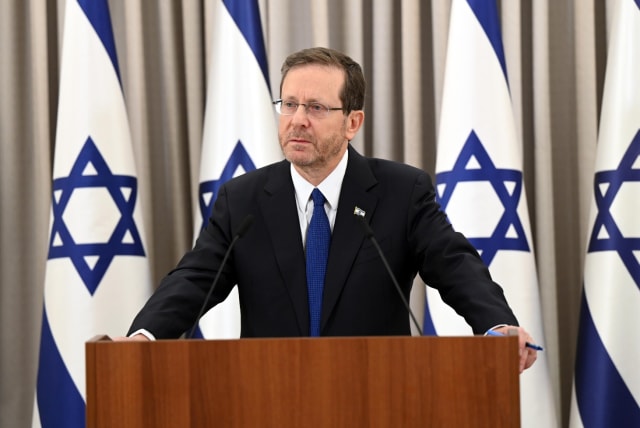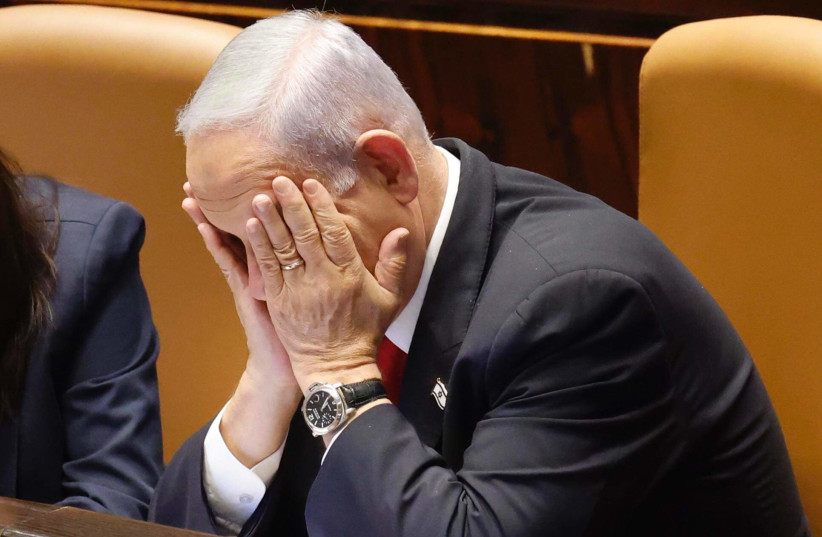Herzog: There's still time for dialogue on judicial reform

The first reading of the judicial reform passed its vote in the Knesset on Monday night.
Israeli politicians and public figures responded on Tuesday morning to Monday night's vote on the reform's first reading.
President Isaac Herzog said in an interview at a Yediot Ahronot conference that he was "disappointed" and that he had "hard feelings" that his call for the sides to enter negotiations before Knesset's first reading did not bear fruit, but that there was still time for dialogue.
"We need to make every effort so that following this vote it will be possible to continue negotiating, to reach an agreed outline that will take us out of this difficult period, into a period of agreed constitutional reform.
Herzog: Judicial reform is not a done deal
"The dispute can be resolved. The majority of the people want a solution, the majority of the people want an agreed outline," Herzog said.
"This is not a done deal because though it has passed the first reading, it has still yet to pass a second and third reading.
"It is right and proper that you find a way to reach out in such a way as to allow a sense of trust in the process, in the negotiation process," Herzog said, addressing the coalition. "Prove generosity as winners, find a way to bring the opposition to negotiations."
"I said what I had to say clearly," he added. "It's clear that I'm disappointed that [my initiative] was not answered, but I think it's already behind us and we need to move forward. Reality demands that we begin dialogue," Herzog said.
Protest organizers criticized Herzog.
"The president abandoned the guiding principle that he himself established: freezing the legislation in the state it was before the votes in the committee and the plenum. It seems that he thinks he is the president of the Likud and not the president of the state. Instead of expressing a firm position against the 'Basic Law: The Dictatorship', he chooses to blame the hundreds of thousands who took to the streets as the ones to blame for the situation and not those who are trying to assassinate democracy. The president should come out and declare that this is an unconstitutional law," the organizers said.
Prime Minister Benjamin Netanyahu called for dialogue in a video statement published on Tuesday evening.
"I hear the voice of the people - I hear those who bless us and I also hear those who are afraid," he started. "When there are disagreements between us, we can - and should - talk, in order to reach an agreement or at least to reduce the disagreements between us.
"I believe that we can do this but it requires one basic thing – it requires leadership and national responsibility. I am willing to give all of the backing and support that are required to lead to agreements, but in order to do so it is necessary to stand and talk.
"Unfortunately, until this moment, no one on the other side has risen," the prime minister said.
Netanyahu did not mention that the coalition was continuing the legislative process at full speed, which is what opposition leaders claim proves that there is no real intention for dialogue. The prime minister cannot comment on the content of the reform publicly due to a conflict-of-interest agreement he signed, which says that he cannot engage in moves that could affect his ongoing criminal trial.
Michaeli: No point in dialogue, protests should continue
Labor chairperson MK Merav Michaeli argued that there was no longer any point in dialogue and called for the protests to increase.
"The most dangerous thing for democracy now is for the greatest and most important protest in the country's history to pause," Michaeli wrote on Twitter in response to another opposition MK, who called for a halt in protests in exchange for a freezing of the reform's legislation.
"On the contrary. Now is the time to accelerate at full strength," she wrote.
Abbas calls for negotiations at president's residence
Ra'am chairperson Mansour Abbas argued that it was time for dialogue.
"The responsible act now is to begin negotiations immediately between all of the opposition leaders and coalition leaders at the president's residence, and in parallel continue the protest in the streets in order to prevent a destructive and unbalanced legislative process in the Knesset," Abbas on Radio Nas.
National Unity number two and former justice minister MK Gideon Sa'ar wrote on Twitter, "The only correct strategy for a parliamentary opposition that is convinced of the truth of its ways is a formidable stand in a long struggle. The opposition today is a minority in the Knesset but a majority in the public supports its positions. We see this in the street and in every public opinion poll that is published. A formidable standing up for principles is the key to victory. If we do this – it will come."
Ohana: Giant step for governance
Knesset Speaker Amir Ohana expressed joy over the bill passing its first reading.
"Last night something changed in the Knesset: The changes to the judicial system that are so necessary and the formalization of its relation to the most democratic branch [of government] took a small step forward in terms of legislation – but a giant step [forwards] in governance. The unavoidable result – a more varied judicial system," Ohana said at a B'sheva Group conference in Jerusalem.
"Israel this morning is far more democratic than Israel of yesterday; no more of the tyranny of the minority, but yes to consideration of the minority.
"There is no majority in the Knesset for malice, evil and cruelty. Supporters and detractors [of the reform] – we may be political opponents but we are not enemies. We are part of one nation," Ohana said.
Jerusalem Post Store
`; document.getElementById("linkPremium").innerHTML = cont; var divWithLink = document.getElementById("premium-link"); if (divWithLink !== null && divWithLink !== 'undefined') { divWithLink.style.border = "solid 1px #cb0f3e"; divWithLink.style.textAlign = "center"; divWithLink.style.marginBottom = "15px"; divWithLink.style.marginTop = "15px"; divWithLink.style.width = "100%"; divWithLink.style.backgroundColor = "#122952"; divWithLink.style.color = "#ffffff"; divWithLink.style.lineHeight = "1.5"; } } (function (v, i) { });

